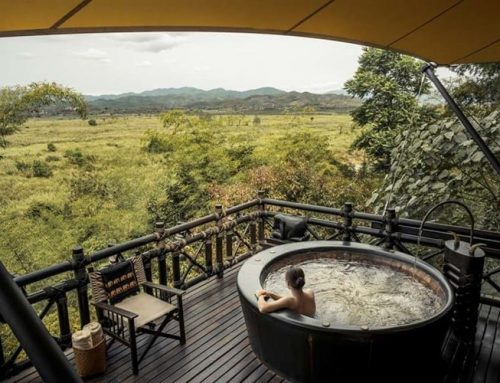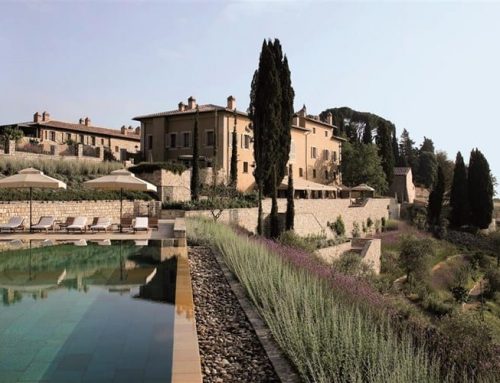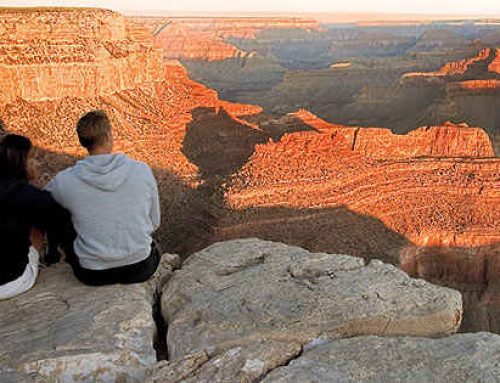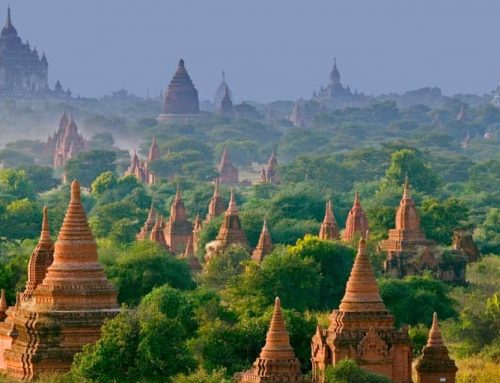The mahout tells me to move up. But much further and I will be the human version of a hat — crowning a hair-sprinkled, bulbous head at a height more than twice that of most normal men. The mahout (elephant trainer), widely grinning, keeps beckoning, so I wobble forward, not really sure where to put my hands. At last, I wedge into a comfortable crevice of wrinkly skin, positioned somewhere between two palm-shaped ears, feeling as tall as the tree tops. More timorous than I expected to be, I grip several tons of girth with my knees, lean forward a bit and wrap my hands around some hills protruding from a massive skull. I pray I don’t fall. It’s a long way down to the ground from atop an elephant.
Waiting for our mahout training session, I focus on the bamboo jungle that surrounds me. Far flung, this landscape ably distracts and fascinates. Burma’s just across the water; Laos is a stone throw away. Nearby, the caramel-colored Ruak River, a tributary of the Mekong, runs. It whispers gently, a musical undertone to the jug band cacophony of the various birds who tik-tik, pi-pi and trill in apparent disregard for harmony. The crickets, their buzz saw calls piercing and high-pitched, impale the steamy air, too. In one area, banyan trees spread their roots, interconnected, like a crowd of clasped hands across the expanse. Next to me, teak trees rise like columns; beneath them big lizards dash by, in speed demon fashion. As is if to remind me that this might be a fairy tale, the soft sound of children laughing arrives with the breeze. I think of Mowgli — could this be a fairy tale?
“Meet Phuang Phet,” says the mahout as he hands me a cluster of bananas. “Her name means handful of diamonds.” He utters a command in Thai, and “Phet” flips her undulating, charcoal-colored trunk backwards toward me. Like a periscope, the trunk spies what she wants, and charmingly greedy, she seizes the bananas from my hand, wrapping them in her trunk like a gift. With a flourish, Phet deposits them in her pink pocket of a mouth all at once. In a flash, the bananas disappear. Forgetting about balance, I wrap my arms around her, smitten, suffused with the joy of elephant love.
If I had eyelashes as long as an Asian elephant’s, I’d stay glued to a mirror admiring my distinctive beauty. As it turns out, elephants, weighing in at a Rubenesque three tons, standing an average of 10 feet high, do know how to recognize themselves. With big personalities, Asian elephants, found from India to Thailand, share a unique ability with apes, dolphins and humans to identify their individuality in a mirror, according to scientists. Smart, sweet and with a penchant to form intense bonds, they might be the perfect family pet — except for their size, how much they must eat to survive, and the fact that their waning population marks them as endangered.
Celebrated in much of Asia, pachyderms also have been misused and abused. Numbering in the hundreds of thousands just a century ago, the Asian elephant population has dwindled to less than 40,000 — thanks to poaching and maltreatment in the workplace. In Thailand, elephants, who still roam free in the forests, played a key role in the teak logging industry. But their domination by insensitive humans led to early mortality and diminished numbers. A crackdown and public recognition of the problem, especially by Thailand’s royal family, led to the eventual ban of illegal logging and the practice of working elephants literally to death.
Nevertheless, the mahout cult — mahouts are trainers, handlers, riders and in most cases, whisperers — remained strong. When elephant use in logging was forbidden, many mahouts lost their jobs and ability to care for the animals. Some took their well-trained animals to the streets for cheap performances, tricks and rides that were unsafe for both tourists and elephants. This exploitation, while still found across Asia, has been seriously condemned.
Fortuitously, other mahouts, intensely loyal to their elephants, protected them, and sought a path to keep them safe. Enter savvy hoteliers, environmentalists, biologists and naturalists who recognized that it was possible to bridge the gap between responsible tourism and elephant welfare. Forming reserves and foundations with the purpose to care for once-abused elephants and their offspring, these coalitions created safe places in Thailand, where elephants could be studied, pampered, and kept healthy in their natural environment. With veterinarians and experts on hand, the preserves continue to focus on elephant wellness, but also allow tourists to mingle with the noble creatures, feeding, stroking, bathing and riding them for limited periods of time. The profits collected are reinvested into these foundations and preserves, to continue the care, feeding and respectful treatment of elephants. While tourists experience the awe-inspiring creatures, the ancient connection between man and beast is renewed in a loving way.
I meet Phuang Phet at the Four Seasons Tented Camp Golden Triangle resort, an all-inclusive, 15-room, luxury hotel, set among the tea fields, verdant bushland and gleaming golden buddhas of far northern Thailand. Once notorious as an opium growing region, this remote area follows the ridges and valleys of mountains and the banks of the Mekong. A misty landscape that edges the Golden Triangle Asian Elephant Foundation, a 75-minute drive and a longtail boat ride away from Chaing Rai, the resort stretches out over several kilometers.
A fanciful suspension bridge serves as part of a hilly path that winds through the property. Signs urge you onward. “Don’t give up,” entreats one. Canvas-roofed cabins, perched cliffside, immerse guests into a 19th century dream world of explorer’s artifacts, exotic fantasy and historical gravitas. A private outdoor shower recalls an al fresco campground, while a grand, hand-hammered copper bath tub punctuates the heart of the room. An ample deck holds couches, stacked vintage suitcases and old lanterns, but there’s also two lavish massage tables just in case you want to request a spa treatment a deaux amid the greenery. At path’s end, the evocative Burma Bar showcases a sunset that matches the arcane allure of the setting — such accoutrements as a feathered lamp shade and a shelf full of hand-carved, painted Thai dolls set a mood. A martini, made vodka infused with galangal — a type of ginger — and the herbs used in Tom Yum soup, incites conversations with other guests, who share their exploits of the day. Conniving in this bar is akin to sitting around the campfire sharing tall tales.
With activities from feeding elephants to bathing them, learning commands such as “pai” (go) or “bong” (drink) as they take the beautiful creatures on short treks, guests spend days in this safari-like setting communing with Asian elephants. The Golden Triangle Asian Elephant Foundation and the Four Seasons pay for the upkeep of every elephant in their care, as well as those who do not interact, for various reasons, with guests. The Four Seasons itself spends more than $1,000 a month on each elephant to ensure a safe and happy home for them. This amount also helps supplement the mahout and his family. Guests have the opportunity to donate to the foundation as well. Besides elephant play, guests enjoy cooking classes, foraging walks, spa treatments and field trips to Burma. But nothing can really top that trip with your elephant.
It’s as bonding as love at first sight.
IF YOU GO
Fly: Cathay Pacific Airways, awarded “World’s Best Airline” numerous times, makes flying to Thailand comfortable and easy. From Austin, you’ll head to Los Angeles to take their night flight to Hong Kong. Layovers in extravagant lounges, replete with noodle bars, sit-down restaurants and champagne taverns, add to the fun. You’ll continue on their subsidiary airline, Dragonair (cathaypacific.com).
Stay: Four Seasons Tented Camp Golden Triangle. Four-night adventure package, all-inclusive (activities, food, drink and more) is $2,330 a night. Departure Lounge travel clients receive special perks and upgrades.
By Becca Hensley. First published in the Austin American-Statesman on October 31, 2015. For assistance with planning and reserving a trip inspired by this article, contact Becca Hensley at [email protected] or speak to your Departure Lounge travel advisor.










